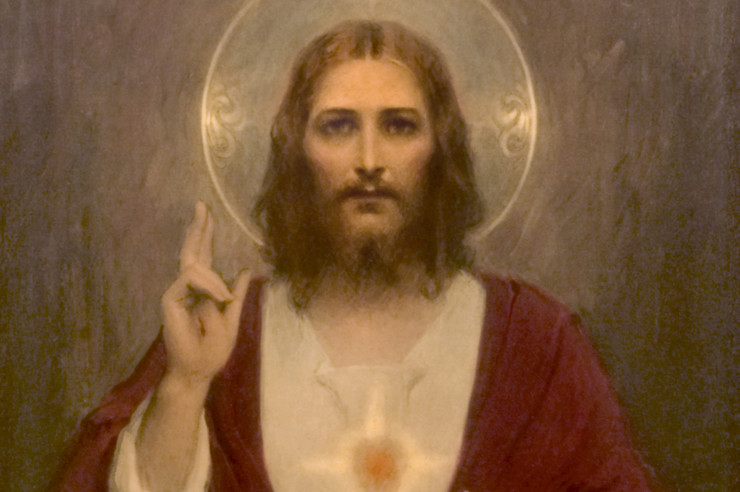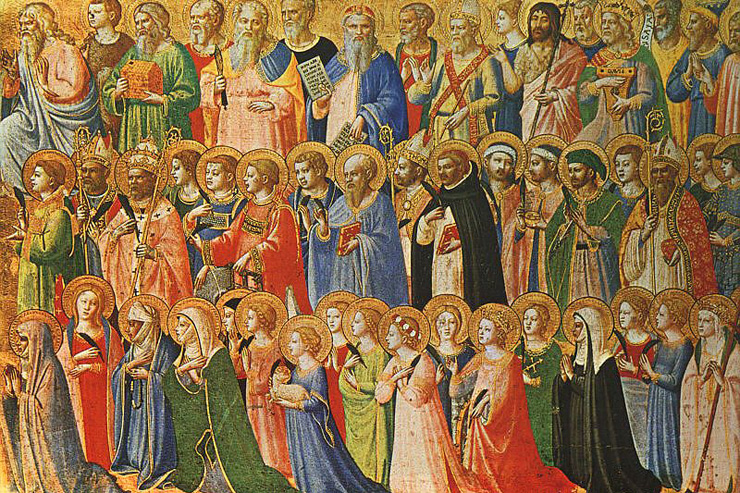Image: Sacred Heart of Jesus (detail) by Chambers | via Restored Tradition
A hundred years later, the problems have not changed. And neither has the solution.
For those of us who call the United States of America our home, Christ the King might not be the image of Jesus that resonates with us the most. We have been raised on stories of the American Revolution more often than those of Sts. Henry II, Louis IX, or Edward the Confessor. Even many of the fictitious kings we grew up with were evil or bumbling and ineffective.
So for this feast, we first need to purify our idea of kingship. Christ is the perfect king, and his reign is universal. He reigns as a loving king, and if we submit to Him in obedience, our lives will be at peace (even if the world around us is not). I love the full title (as of 1969): the Solemnity of Our Lord Jesus Christ, King of the Universe. There is nothing in existence that is not ruled by Christ.
It is a relatively new feast, founded in 1925 by Pope Pius XI to combat both growing secularism and nationalism. The world after the First World War saw a rise of dictatorships and a loss of Christian culture. Nations were being founded and refashioned with little to no regard to the Christian roots of Europe. New political parties were growing on the right and on the left. Governments were losing their faith and their Christian grounding. As the Pope wrote the letter establishing this feast, his home was surrounded by a (relatively) new kingdom that had stolen the Papal States and was now experiencing the rise of Fascism.
Pope Pius XI desired that by establishing the feast, nations would be reminded that they were “bound to give public honor and obedience to Christ.” He wanted governments to remember that they must “take account of the commandments of God and of Christian principles, both in making laws and in administering justice, and also in providing for the young a sound moral education,” and that they would be answerable to God for this at the Last Judgment (Quas Primas, 32).
As we approach the end of the liturgical year, we are reminded of this final judgment. Every day, He offers us His mercy. But at the end of our lives (or at the end of the world, whichever comes first), He will come as judge. Our lives will be laid out before Him, and everything will be examined in light of: Was Christ my King?
In his encyclical establishing the feast, Quas Primas, Pope Pius XI wrote,
“If to Christ our Lord is given all power in heaven and on earth; if all men, purchased by his precious blood, are by a new right subjected to his dominion; if this power embraces all men, it must be clear that not one of our faculties is exempt from his empire. He must reign in our minds, which should assent with perfect submission and firm belief to revealed truths and to the doctrines of Christ. He must reign in our wills, which should obey the laws and precepts of God. He must reign in our hearts, which should spurn natural desires and love God above all things, and cleave to him alone” (33).
Does he reign over my mind, will, and heart? This feast should challenge us. Is everything I do ordered to His kingship?
The evil that surrounds on this earth is the result of a rejection of Christ the King. Pius began Quas Primas recalling what he said in his first encyclical Ubi arcano Dei consilio (On the Peace of Christ in the Kingdom of Christ). In that encyclical, he referred to the evils that threatened the world at that time including war, famine, and epidemics. He mentioned other things that might sound familiar to us as well: “Public life… enveloped … by the dense fog of mutual hatreds and grievances,” families broken apart, the loss of the sanctity of marriage, and the rise of impurity. He referred to “legislation … passed which did not recognize that either God or Jesus Christ had any rights over marriage.” He spoke of “Jesus Christ, as well as His doctrines… banished from the school.”
And in a quote that could have been uttered in 2021, he said,
“Just as the smallest part of the body feels the effect of an illness which is ravaging the whole body or one of its vital organs, so the evils now besetting society and the family afflict even individuals… Is it surprising, then, that we should no longer possess that security of life in which we can place our trust and that there remains only the most terrible uncertainty, and from hour to hour added fears for the future? Instead of regular daily work there is idleness and unemployment. That blessed tranquility which is the effect of an orderly existence and in which the essence of peace is to be found no longer exists, and, in its place, the restless spirit of revolt reigns. … Men today do not act as Christians, as brothers, but as strangers, and even enemies” (Ubi arcano Dei consilio).
A hundred years later, the problems have not changed. And neither has the solution. In Quas Primas, Pope Pius XI told us that these aforementioned struggles “are due to the fact that the majority of men had thrust Jesus Christ and his holy law out of their lives; that these had no place either in private affairs or in politics: and…that as long as individuals and states refused to submit to the rule of our Savior, there would be no really hopeful prospect of a lasting peace among nations.”
We can get discouraged and scared by everything that is wrong with the world. If you find yourself anxious or depressed, you are not alone.
Instead of allowing these evils to discourage us, we need to focus on what we can do. We can accept His reign. Do not forget that you are on this earth to serve Christ the King. This entire universe was created for that purpose: that we may know, love, and serve God and join Him in heaven at the end of this very brief time in the valley of tears. We were not created for this earth – quite the contrary. It was created for us, as an instrument to get us to the kingdom of God in its fullness: heaven.
Perhaps we cannot control whether our nations accept the rule of Christ the King. But we can accept His rule. We can make Him King of our mind, heart, and will. We can direct all of our thoughts and actions to Him, taking “every thought captive in obedience to Christ” our King (2 Cor 10:5).
If we stay faithful to Him, He will remain faithful to us. Remember, at the end of our lives, we will be judged by our lives, not the lives of others, and the simple question: Was Christ my King? Live in the present moment, cast your anxiety aside, and know that if you are a loyal subject in the kingdom of God in this life, an even greater kingdom will await you in the next.
“Fear not, little flock, for it is your Father’s good pleasure to give you the kingdom” (Luke 12:32)














